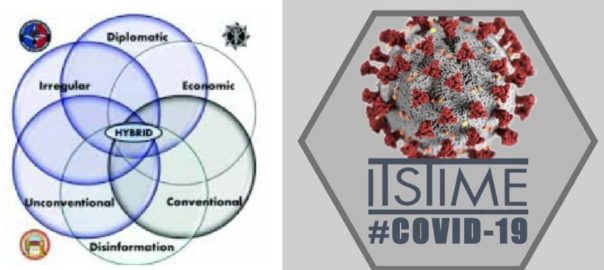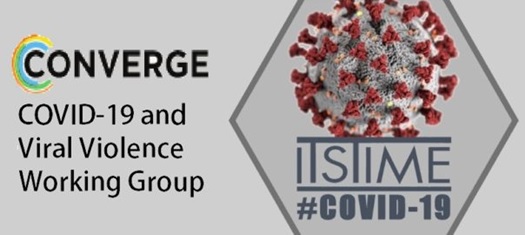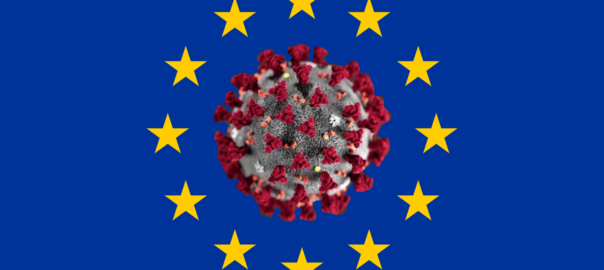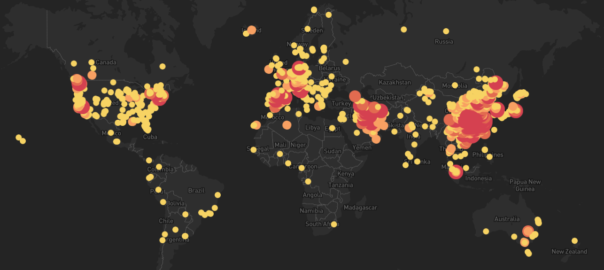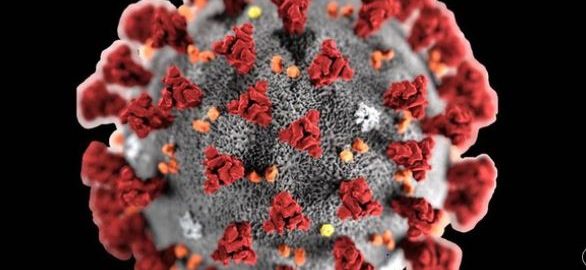Il 21 febbraio 2020 con la scoperta dei primi 16 casi italiani di Covid-19 inizia cronologicamente la “Crisi Coronavirus” del sistema-paese Italia, che verrà dichiarata ufficialmente pandemia dall’OMS l’11 marzo[1]. Continue reading
All posts by Marco Lombardi
COVID-19: la pandemia nel quadro interpretativo del conflitto ibrido – by Marco Maiolino
Sulla base dei dati forniti dallo European Centre for Disease Prevention and Control (ECDC), ad oggi risultano accertati 416.916 casi di COVID-19 localizzati, in concentrazioni diverse, nelle Americhe, in Europa, in Africa, in Asia ed in Oceania[1] (dati aggiornati al 25/03). Continue reading
COVID-19 and the virus of violence – by Maria Chr. Alvanou
These couple of months the world has been facing a whole new reality. The epidemic of Coronavirus became a global problem of dimensions that go far beyond the medical struggle to save lives. Continue reading
COVID-19: lo Stato Islamico rilancia. Propaganda e minacce ai tempi dell’infodemic -by Daniele Plebani
We’re not just fighting an epidemic; we’re fighting an infodemic. Fake news spreads faster and more easily than this virus, and is just as dangerous. – Tedros Adhanom Ghebreyesus, Direttore Generale dell’OMS[1] [The] fear of the epidemic among them has done more than what the epidemic itself has done– al-Naba 226[2] Continue reading
The Jihadi Ever-Evolving Online Financing Ecosystem – by Daniele M. Barone
At the end of February, a summit of the G20 Finance Ministers and Central Bank Governors held in Riyadh, Saudi Arabia[i], pressed countries to align themselves with global cryptocurrency standards from the intergovernmental organization, FATF (Financial Action Task Force), on standards on virtual assets and related providers[ii]. Continue reading
COVID-19, terrorism, the refugee and financial crisis: where is EU solidarity? – by Maria Chr. Alvanou
The European Union was founded with the vision of unity for its Member States. Its supporters highlight exactly this also as the spirit governing its function. Continue reading
The institutional symmetry of an asymmetric conflict. A State – State rivalry throughout Daesh’s widespread storytelling – by Daniele M. Barone
To date, Daesh has been dismantled, deprived of credibility, and with no remaining strong leadership but still up and unpredictable. The latest release, a few days ago, of its first piece since January 2019 from foreign language media al-Hayat named “The People of Zeal and Bravery”[i], the inclusivity shown by the organization in the Sahel[ii], and the shift of the group’s online followers to decentralized chat rooms after the Referral Action Days operation by EUROPOL on Telegram[iii] it’s a warning on the uselessness of kinetic actions taken against the group. Continue reading
COVID-19, Stato Islamico, guerra ibrida: alcuni scenari – by Daniele Plebani
La pandemia di COVID-19 si è diffusa rapidamente in tutto il globo, investendo come fenomeno non solo i singoli ma anche le società cui questi appartengono. I gruppi terroristici non fanno eccezione: in particolare, le “nuove” contromisure adottate da Stato Islamico (IS) sembrano aver riscosso singolare attenzione da parte dei media sebbene non fossero in realtà né nuove (risalendo le prime note apparentemente già a gennaio) né certamente rivoluzionarie[1]. Continue reading
International Women’s Day: Why combatting violence against women is a security issue – by Maria Chr. Alvanou
Security is believed by many to be exausted in terrorism, extremist violence and any violence that targets public order. Thus any policy regarding safeguarding security is designed towards countering the above threats. Continue reading
COVID-19: la crisi del Crisis Management – by Barbara Lucini
I sentimenti della massa sono sempre semplicissimi e molto esagerati. La massa non conosce quindi né dubbi né incertezze. Corre subito agli estremi, il sospetto sfiorato si trasforma subito in evidenza inoppugnabile, un’antipatia incipiente in odio feroce. […] (Freud, S. Psicologia delle masse e analisi dell’io, 1921) Continue reading
COVID-19: la gestione della comunicazione pubblica – by M. Lombardi
Chernobyl fu il disastro nucleare del 26 aprile 1986 in Ucraina. Allora eravamo in un regime comunicativo differente dall’attuale. Alcuni paesi, come la Francia ma non solo, tennero strategicamente una comunicazione contenuta dell’evento e delle sue ricadute. Continue reading
Hanau – estrema destra: Germania sotto attacco? – by Barbara Lucini
L’attacco in Germania a Hanau, Assia, operato da parte di Tobias Rathjen, 43 anni, che ha ucciso 9 persone presenti in vari punti “shisha bar” della città, sua madre e poi si è suicidato, ci mostra ancora una volta quanto la problematica dell’estremismo, che qui sembra connettersi allo stampo di destra, sia sottovalutata. Continue reading


